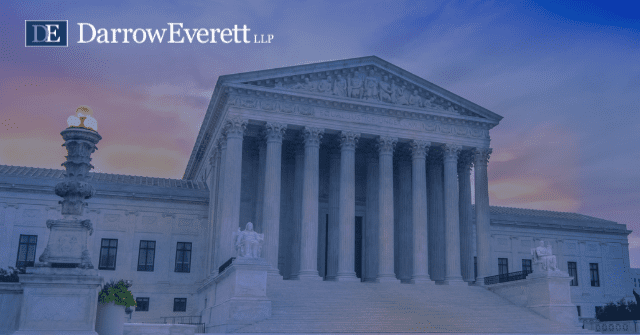Estate Planning for Your Real Estate Business: Tips to Preserve Value
Real estate business owners face unique challenges that many business owners in other industries do not experience. The real estate market climbs and falls, contractor fees and material costs rise with inflation, and high interest rates can destroy the profitability of a real estate portfolio. These added complexities mandate more complex planning for ownership and…
Read MoreFifth Circuit Puts the Brakes on SEC’s Private Fund Rules: What’s Next For Private Fund Advisers
In a continuation of recent court decisions overturning the rule-making authority of federal agencies, a recent decision by the U.S. Court of Appeals for the Fifth Circuit vacated the Securities and Exchange Commission’s (SEC) Private Fund Adviser Rules (the “Rules”), which had been adopted in August 2023. The Rules were aimed at increasing regulatory requirements…
Read MoreTerminating Employees? Ignoring State And Local Wage Laws Can Cost You
Terminating employees can be a daunting task. Failing to follow your state or local rules when terminating an employee can make the task exponentially more difficult and expensive. When a business plans on firing or laying off an employee (known as “involuntary termination”) it is imperative business owners consult state and local laws prior to…
Read MoreIRS Targeting Partnership Basis-Shifting Transaction Schemes
The Internal Revenue Service (“IRS,” or the “Service”) issued guidance on June 17, proposing new regulations and releasing a revenue ruling to challenge the use of basis-shifting transactions by complex partnerships. In making its announcement, IRS officials stated that closing this loophole could result in over $50 billion in new tax revenue for the U.S.…
Read MoreThe Cost of Ambiguity: Post-Chevron Compliance Could Be Expensive
In a landmark decision issued on June 28, 2024, the Supreme Court in Loper Bright v. Raimondo and Relentless v. Department of Commerce (“Loper Bright”) overturned the Court’s 1984 opinion in Chevron, U.S.A., Inc. v. National Resources Defense Council, Inc. (“Chevron”). In a 6-3 decision, the Supreme Court held that the Chevron doctrine “cannot be…
Read MoreProactive Protections Against CIPA Mass Arbitrations? Updated Terms of Use
Businesses operating public facing websites that employ data analytics software to track users’ website interactions must be aware of a novel use of the California Information Privacy Act (“CIPA”) that has taken the plaintiffs’ bar by storm. Specifically, class action complaints and demands have been filed in abundance under California Penal Code Section 631, California’s…
Read MoreWhen Florida’s Transfer Tax Applies to Real Estate Deals: Handy Scenarios
Buyers and sellers of real property anticipate some tax consequences from a real estate transaction, but typically these concerns are limited to federal income tax implications. The reality is that most states impose various taxes that could affect the cost of the entire transaction, and they are either not considered or understood. One of these…
Read MoreSummarizing Proposed Changes to Florida Rules of Civil Procedure
The Florida Supreme Court has taken steps to improve the efficiency and effectiveness of civil litigation, and it has issued two[1] separate[2] per curiam opinions introducing proposed substantial amendments to the Florida Rules of Civil Procedure (the “Rules”) in order to expedite what has proven to be a backlog of cases (recently, a judge in Miami-Dade County stated…
Read MoreBuy, Sell, Pay Taxes: SCOTUS Decision Places Its Own Premium on Buy-Sell Insurance
All U.S. closely held businesses just received a warning from the highest court in the land that they should review their succession plans (or else risk a higher tax bill for the estates of their owners). On June 6, 2024, the Supreme Court of the United States (“SCOTUS”) issued its unanimous decision on Connelly v.…
Read MoreDecisions, Decisions: Choice of Entity vs. Choice of Tax Classification
Before forming any entity, founders need to make two fundamental decisions: which entity type is best for their business operations and which tax classification is best for the owners. Although the entity type and tax classification can be changed after formation, some forethought before forming a business can reduce expenses, taxes, and headaches. Choice of…
Read More









